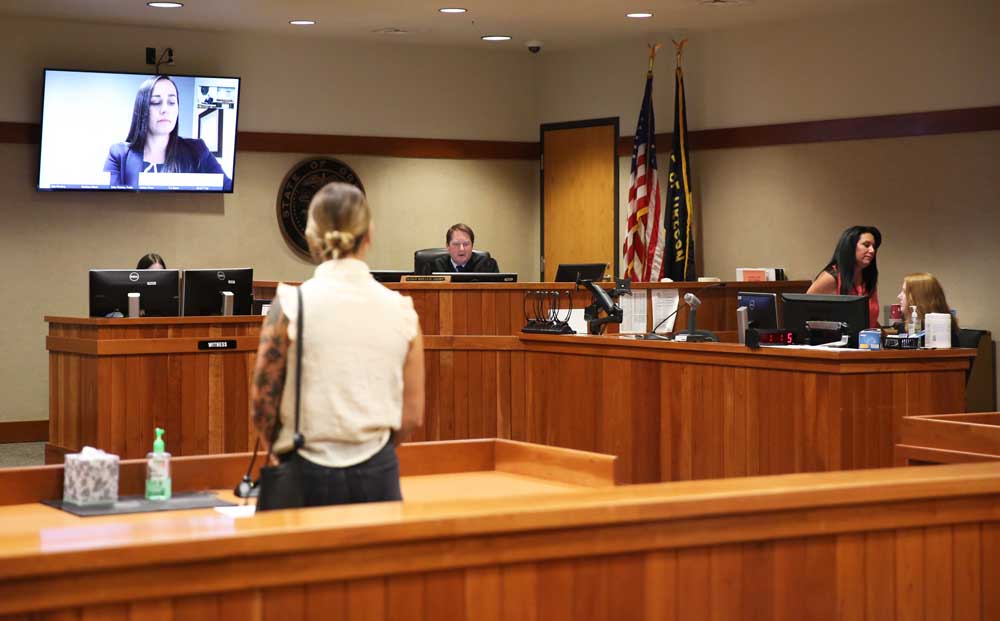Gov. Kotek, defense commission seek expansion of Oregon-run trial defense team
Published 6:47 am Tuesday, August 5, 2025

- Court is in session in Judge Wells Ashby’s courtroom in the Deschutes County Courthouse in Bend in 2021.
State lawmakers are awaiting a 2026 legislative report evaluating the performance of contracted and state-employed lawyers
Oregon leaders have agreed to grow a team of deployable public defense lawyers who take on demanding criminal trials, seeking to align with impending legislative requirements for the state to begin employing more of its own defense attorneys rather than hiring contractors.
The Oregon Public Defense Commission vowed in a press release last week to work with the governor’s office and the Legislature to expand the state’s trial division team, a group of more than 20 specialized attorneys who work across the state to take on particularly complex or urgent criminal defense cases. The agency, led by a 13-member panel, is tasked with upholding Oregonians’ constitutional right to defense counsel.
The plan comes after Gov. Tina Kotek approved the agency’s 14.8% budget increase, saying in a July 24 signing letter that the number of Oregonians accused of crimes without representation “has stabilized and has even started to decrease across Oregon.” In that message, however, she said she would be pursuing a “more moderate expansion” of the trial division in comparison to the additional 40 state lawyers and support staff she had unsuccessfully proposed in her budget this past session.
Trending
Oregon relies on a patchwork of systems to provide defense attorneys for thousands of people accused of crimes, including through contracts with nonprofits and a “consortia” model through agreements with private law firms. The trial division, employed in three state offices in Portland, Salem and Medford, is the smallest unit aiming to provide representation for defendants.
But Kotek says that model needs tweaking, pointing to Senate Bill 337, a law passed in 2023 that mandates at least 20% of the state’s public defenders be state employees by 2031 and at least 30% by 2035. She referred to a June plan from Ken Sanchagrin, the commission’s interim executive director, to take advantage of the trial division’s resources and expand existing caseload eligibility for contracted attorneys.
“Investments in the trial division are crucial if Oregon is to end the unrepresented crisis, as indicated by Director Sanchagrin’s analysis and plan,” she wrote. “Nationally, Oregon is an outlier in its heavy reliance on contractors to provide public defense services.”
Sanchagrin told the Capital Chronicle that all forms of public defense services, such as through contracts and the state trial division, are necessary. He said that he was happy to see that lawmakers backed away from a sunset on consortia contract eligibility this past legislative session, using House Bill 2614 to instead increase transparency and rules around their usage.
“We’re all part of an ecosystem that makes the whole system work. I think that the capacity that the trial team brings in Marion County, for example, has been essential to those numbers coming down,” he said. “But that being said, again, it’s not really one versus the other.”
Kotek had fired the agency’s previous executive director in April, saying she had not done enough to stem the state’s public defense crisis. At the time, the number of unrepresented Oregonians stood at more than 4,000, a figure that peaked in May and has since dropped to 3,289 as of the beginning of August, according to the state’s dashboard.
Smaller trial division remains in place
Trending
Sanchagrin’s June plan called for the trial division to be strategically used in the six counties where the crisis is most acute: Coos, Douglas, Jackson, Marion, Multnomah and Washington. Although his plan calls for deploying them in particularly demanding cases, he doesn’t have the authority to hire more people onto the team.
When lawmakers increased his agency’s budget by more than 14% in the past legislative session, they chose not to include extra funding for additional lawyers for the state’s 46-member trial division, 21 of whom are defense attorneys. That compares to 761 attorneys employed through private law firms, coalitions of those firms, or nonprofits that contract with the state, according to the public defense commission.
The trial division is based in state offices in Salem, Portland and Medford, taking on specialized cases that require representation within seven days of a person being taken into custody or handling complex dynamics such as mental health, language barriers or lengthy investigations. Lawmakers held off on expanding their numbers this past session in light of political pushback from advocates for nonprofit and consortia defense models, said Rep. Paul Evans, D-Monmouth.
But the Legislature will likely have more clarity on the efficiency of both contracting and state-employed defense lawyers in the 2026 legislative session. Lawmakers are withholding more than $22 million of the defense commission’s $707.7 million budget until it delivers a report to the Joint Committee on Ways and Means in the 2026 legislative session. Those findings are expected to detail the performance of both trial division staff and contract providers who are working at under 90% of their expected capacity.
“I was willing to support a temporary hold on expansion of the trial division, so long as they filled out all the positions which they’re working toward and used them in a much more effective manner than previous leadership,” Evans said. “At the same time, (let’s) try to get into a situation where we can have an apples to apples comparison of which models are actually the most efficient.”
Sanchagrin, however, said he believes the funding will be made available so long as the commission is able to show lawmakers how it will ensure those providers and staff operate more efficiently. He pushed back on a question about the different impact contracted or trial division lawyers have made on stemming the state’s public defense shortage.
“I would never want to pit those two against each other,” he said.






